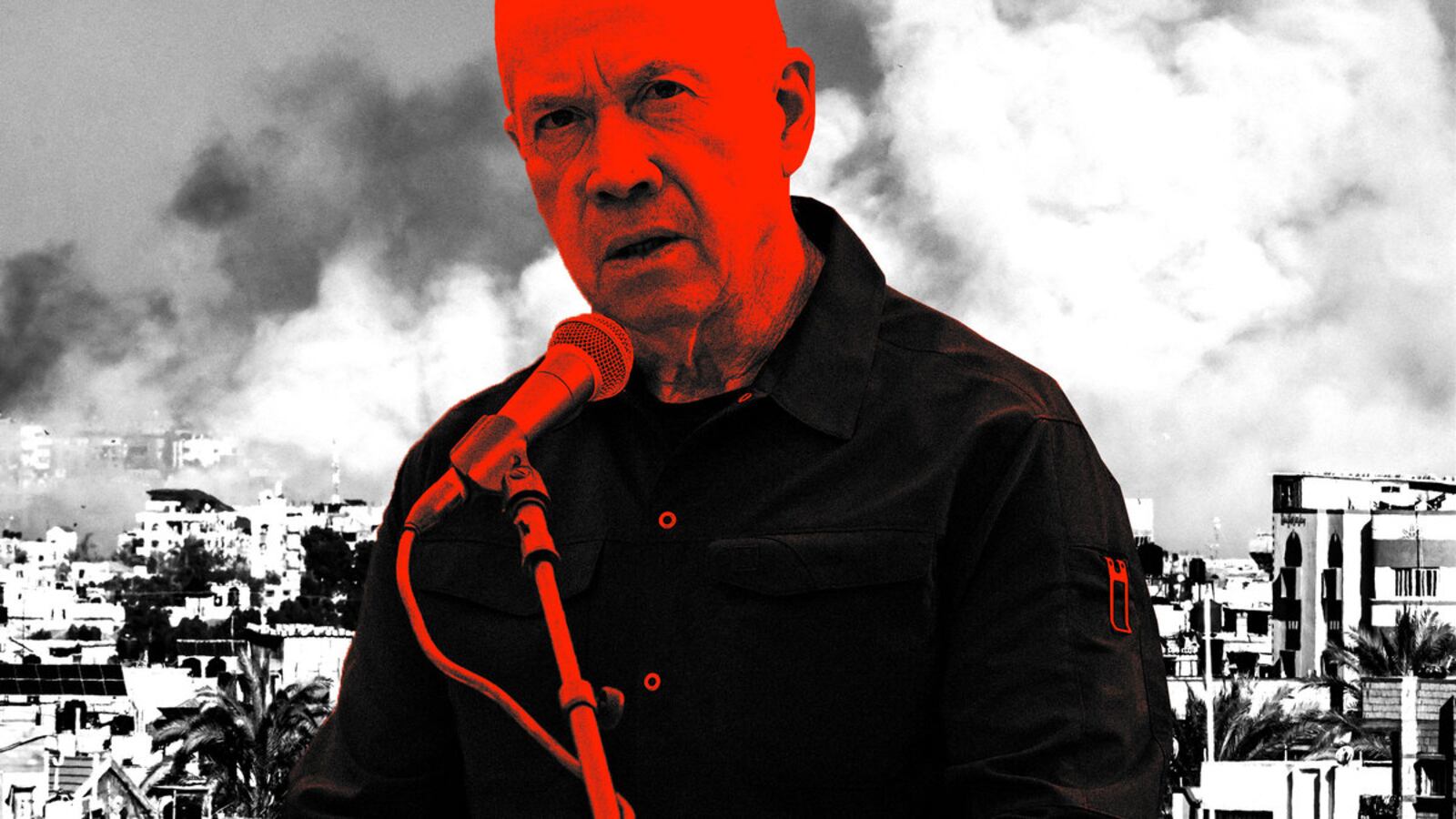Israel has a plan for Gaza—and unsurprisingly, it’s not altogether popular.
Israel’s Defense Minister Yoav Gallant, a moderate member of Prime Minister Benjamin Netanyahu’s right-wing Likud party, floated a proposal for post-war Gaza in recent days, in the face of growing calls to avoid civilian casualties in the war and move beyond bombardment and blockade of the enclave.
But the proposal is filled with stumbling blocks that are already giving Western leaders pause over what the future holds for war-torn Gaza, which Israel has been attacking ever since Hamas’ Oct. 7 assault on Israel.
The proposal also lacks concrete details for how Israel would achieve its vision; it contains several bullet points of overarching goals that lack specific plans of action, and leaves several key unanswered questions.
Gallant’s proposal recommends a U.S.-led multinational task force to handle reconstruction in Gaza, and would have Palestinians without connections to Hamas handle civilian affairs, according to a memo obtained by The Daily Beast. The pitch presumes that Israel has been able to defeat Hamas in Gaza.
The proposal is clear in stating that there will be no Israeli civilian presence in Gaza post-war, but notes that Israel will “reserve its operational freedom of action in the Gaza Strip.” Israel has said it does not want a permanent occupation of Gaza.
Even so, the plan is exposing deep divides about the future of Gaza within Israel and around the world. The United States and Israel differ over who and what authority should govern Gaza, for instance. Gallant’s proposal does not include the Palestinian Authority as part of the solution, while the United States has been encouraging the Palestinian Authority to step up behind the scenes and initiate reforms so it can lead both Gaza and the West Bank in a unified state.
Earlier this week, U.S. Secretary of State Tony Blinken met with Mahmoud Abbas, the leader of the Palestinian Authority, in Ramallah to discuss just that, as part of yet another diplomatic tour in the Middle East since October.
“We talked… about the importance of reforming the Palestinian Authority, Palestinian governance so that it can effectively take responsibility for Gaza… so that Gaza and the West Bank can be reunited under a Palestinian leadership,” Blinken told reporters. “It’s very clear to me from President Abbas that he’s prepared to move forward and engage in all of these efforts.”
When it comes to the future of governing Gaza, the hope is that Gallant’s proposal is just a starting point, according to U.S. Army Lt. Gen. Mark Schwartz, the former United States Security Coordinator for Israel and the Palestinian Authority from 2019-2021. From his viewpoint, the Palestinian Authority seems to be the most obvious choice moving forward, despite the fact that many have seen it as ineffective.
“The Israeli hard right says they’re really obsolete and we don’t need to include them. So, the next obvious question is, OK, well, then who? Who’s gonna do it?” Schwartz said. “There’s no other viable political entity, there just isn’t, other than the Palestinian Authority… and it can’t be Hamas.”
The key will be getting the Palestinian Authority to initiate reforms, Schwartz added.

This picture, taken during a media tour organised by the Israeli military on January 8, 2024, shows soldiers during operations in al-Bureij in the central Gaza Strip, amid continuing battles between Israel and the Palestinian militant group Hamas.
MENAHEM KAHANA / GettyThere are areas in which the United States and Israel have found common ground. The two countries agreed this week that the United Nations could enter and assess conditions in northern Gaza, where Israel has razed entire neighborhoods, to estimate when residents would be able to return.
But how that process will happen is still up in the air. Nearly two million Palestinians are in south Gaza as fighting continues, and the Biden administration wants them to be able to return home as soon as is safe. Israel, however, has said that won’t happen until Hamas releases more hostages—an effort that has been stalled for weeks despite earlier releases.
Gallant’s proposal comes as the Israeli government has said it is shifting to a new phase of the war that will see more targeted operations in Gaza focused on “remaining terror hotspots,” according to a Ministry of Defense document obtained by The Daily Beast. Still, war continues, and when Palestinians may be able to return home—and when airstrikes in Gaza will cease—remains to be seen. And past promises from the Israeli government to tone things down have not held true.
According to the Ministry of Defense document, in the next phase of the war, the IDF will continue conducting raids, destroying Hamas tunnels, and enacting special and aerial operations.
In southern Gaza, Israel is still focused on eliminating Hamas and bringing home hostages, according to the memo.
But it states clearly that the effort “will continue for as long as is deemed necessary.”
NO GUARANTEES
Arab states have also come together to discuss the war in Gaza—but they have not yet outlined guardrails of a common vision for what the future ought to look like, and have focused heavily on ceasefire planning.
Just this week, Egypt blocked a proposal from Israel about oversight over the zone on the Egypt-Gaza border, and will instead be focusing efforts on ceasefire negotiations rather than planning for after the war, according to a Reuters report.
Yet now is the moment for other countries, and particularly Arab states, to get involved in the post-war planning, says Dr. Sanam Vakil, the director of the Middle East and North Africa Programme at Chatham House.
“The risks are of course that if you wait for Israel, that is in a state of revenge, and the United States, that doesn’t seem to have the ability to exert an immense or an effective amount of influence on Israel to think about the day after, then that leaves a vacuum,” Vakil told The Daily Beast. “There’s no guarantee that this conflict is going to end in a two-state solution or a Palestinian state.
“Gallant’s day one suggestion is a negotiation. It’s not a fait accompli as to what we’re going to see as an endgame. But at least he’s put out a vision,” Vakil added. “What we need to see from different Arab states is their ideas, so that this becomes part of a negotiation process.”
The security of the region may very well depend on Arab states’ involvement, says Vakil.
Concerns abound that the aftermath of Israel’s near-total destruction of Gaza will leave a generation scarred, with dire health, humanitarian, and safety concerns that could have domino effects in the region.

People walk on a road near the Gaza Strip's border with Egypt, Jan. 12, 2024.
Rizek Abdeljawad/Xinhua via Getty Images“The situation is very grave. And the deaths that we’re seeing—which have of course been quite high, over 23,000—what we’re not anticipating are the deaths from the impact of this war,” Vakil said. “That’s going to pose a huge amount of pressure on the region, on Israel, it's going to have knock-on effects of liability, of governance, and a cascade of concerns.”
One of the most important post-war steps that Israel and other partners must take is getting humanitarian aid to Gaza, stressed Schwartz. The Israeli defense minister’s proposal would have the entity controlling the territory—which it does not explicitly name—build on existing administrative functions, such as sewage, electricity, and water.
”The most important aspect of this, is as rapidly as possible getting medical supplies, food, shelter, potable water, getting desalination plants up and running again,” Schwartz said. “Getting rid of just metric tons of debris so that rebuilding can start,”
DIVISIONS RUN DEEP
Even as the U.S. and the Israeli government look ahead to a post-war Gaza, extremist sentiment on Israel’s far right could derail carefully laid plans.
Several far-right leaders in Israel has been pushing for the removal of Palestinians from Gaza, a nonstarter for both Arab partners in the region and the Biden administration.
Jordan has been staunchly against welcoming Palestinian refugees to the country. Jordan’s King Abdullah II said last year: “No refugees in Jordan, no refugees in Egypt.” The sentiments are similar in Egypt.
“There’s strong resistance to any resettlement, because temporary becomes permanent, and that’s the biggest concern,” Schwartz explained.
Israeli Finance Minister Bezalel Smotrich has outright rejected Gallant’s plan, and has demanded that the plan needs to involve emigration of Palestinians, Israeli security control in Gaza, and settlement of Israelis in Gaza.
Western leaders have cautioned against such a move. France has warned that the forced transfer of Palestinians out of Gaza would constitute a violation of international law.
The Biden administration has said that a version of post-war Gaza where Palestinians are forcibly removed is unacceptable.
“The United States believes key elements should include no forcible displacement of Palestinians from Gaza—not now, not after the war,” Blinken said at the G7 summit. “No reoccupation of Gaza after the conflict ends.”
And getting buy-in from Arab partners on the future of Gaza will be crucial to making sure that Hamas, or another terrorist entity, doesn’t resurge following the war.
Plotting out security control in Gaza will likely be one of the top priorities moving forward, given how central a vetted and trusted security force will be in keeping Hamas at bay, said Schwartz.
The planning process for a security force should involve Arab governments, said Schwartz.
“You basically have a second opportunity from what they had in 2006,” Schwartz said, referring to when Israel left Gaza after 2005, after which Hamas took over. “When Israel, certainly influenced by the United States, said, ‘Hhey, let’s get the hell out of Gaza,’ they left a security vacuum. And who filled it was a terrorist organization.”
“That’s the concern. We cannot make that mistake again,” Schwartz said.
“If you want to see chaos, let all the IDF depart and then we’ll see who fills the security vacuum and it’s going to be continued terrorist organizations,” Schwartz warned.
The Biden administration has already admitted that after the war Gaza would likely have an Israeli-led security force. Netanyahu himself has also said that Israel will maintain security control of Gaza. The details of what that force would look like remain to be seen; Gallant’s proposal doesn’t touch mid-term or long-term security force-building aside from outlining that Israel will reserve “operational freedom of action” in Gaza, according to the Ministry of Defense memo.
For now, Egypt, which has helped broker hostage releases alongside Qatar, is prioritizing ceasefire negotiations and humanitarian aid deliveries, even as its border remains closed to the millions of Palestinians displaced through the war, according to Egyptian Foreign Minister Sameh Shoukry.
Qatar, too, has been focused on hostage releases and ending the war. In a recent Qatari truce proposal, Hamas would release all the hostages remaining, the IDF would withdraw from Gaza, and Hamas leaders would go into exile.
That idea has been reported as a nonstarter for Israel, which has stated that it would not finish until it has eliminated Hamas.
Planning ahead for the “day after,” though it may seem far off and even difficult to comprehend at a time when tens of thousands of Palestinians are getting killed, is necessary to make sure that a dignified result emerges for the Palestinian people, urged Vakil.
”This is urgent not just for Palestinian security and Israeli security but for regional security,” Vakil said. “Broader Arab and Turkish buy-in is very needed… you want everyone at the table or you want everyone to underwrite a process.”







